The findings of two long-term values questions exemplify the public’s nuanced, but fundamentally positive, outlook on the country’s ability to weather the financial crisis. When asked whether there are “no real limits to growth in this country” or whether “people should learn to live with less” the public has shifted decidedly toward the latter. The number saying that people need to live with less has risen from 41% in 2004 to 49% today – the highest percentage saying this since the question was first asked in 1994.
Yet while many see a need for belt-tightening, the number of citizens saying that “as Americans, we can always find ways to solve our problems” has risen from 59% in 2004 to 64% today, which nearly matches the previous high in August 1999 (63%).
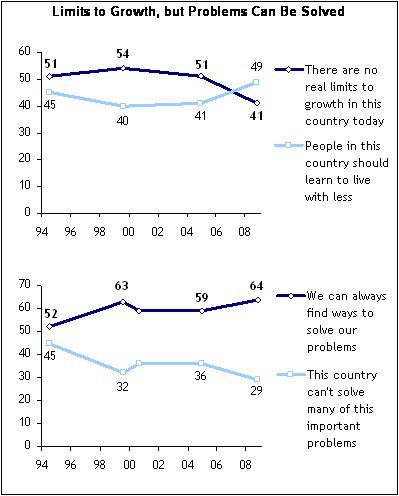
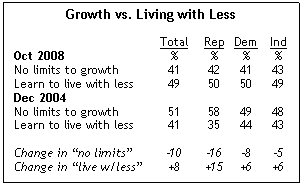
There is substantially less partisan division over these questions than was the case in the period immediately following the 2004 election. For example, Republicans, Democrats and independents today are all equally likely to say that people in this country should learn to live with less. In December 2004, Republicans were less likely than the others to hold this view.
While Republicans are still the most optimistic that the country can always find ways to solve its problems, the number of Democrats and independents sharing this view has increased substantially since 2004 . Currently,
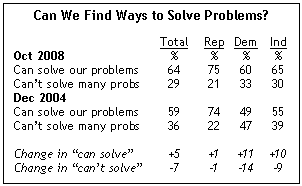
60% of Democrats say that Americans can always find a way to solve problems while 33% say the country cannot solve many of its important problems; in 2004, opinion among Democrats was evenly divided, with nearly identical percentages expressing both sentiments (49% can solve problems; 47% country can’t solve many of its problems). The belief that Americans are able to solve national problems also has increased among independents; 65% express that view in the current survey compared with 55% in December 2004.
Less Support for Help to Needy
Currently, 51% say that “the government should do more to help needy Americans, even if it means going deeper into debt;” 37% take the opposing view, saying that “the government today can’t afford to do much more to help the needy.” In 2004, more Americans (57%) expressed the view that the government should do more for the needy, while 33% said the government could not afford increased aid.
Democrats’ opinions about this issue have not changed much since 2004: 69% now say the government should do more for the needy even if it means greater indebtedness; 68% expressed that view in 2004. But fewer Republicans and independents believe that the government should provide more aid for the needy if it means increasing the debt. Only about a third of Republicans (32%) express this sentiment currently (down from 46% in 2004); there has been a comparable decline among independents (from 58% to 45%).
Regulation OK, But Doubts about Government Effectiveness
While 80% of Americans believe weak government regulation of financial institutions played at least some part in causing the current financial crisis, there is no shift in public support for regulation more generally. Overall, 50% of Americans say government regulation of business is necessary to protect the public interest, while 38% say government regulation usually does more harm than good. This is virtually unchanged from four years ago, and represents a slight drop in support for regulation from a peak of 54% in 2002.

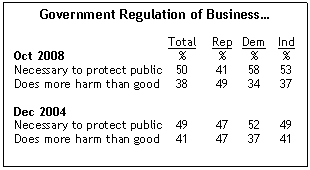
Views of government’s effectiveness have become more negative since December 2004. Fully 57% of Americans today say the government is almost always wasteful and inefficient, up from 47% four years ago. Meanwhile, the share saying the government often does a better job that people give it credit for has dropped from 45% to 35%.
The issue of regulation has also become substantially more partisan over the past four years. In 2004, Democrats were only slightly more likely than Republicans (52% vs. 47%) to
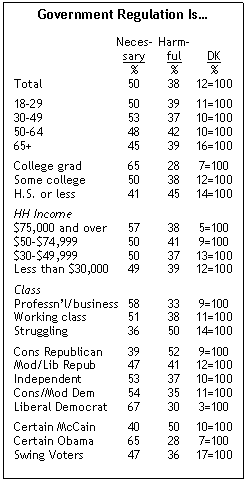
say that government regulation is necessary to protect the public interest. But in the current environment, Democratic support for regulation has increased by six points while Republican support has dropped by the same amount, leading to a wider division across party lines (58% of Democrats vs. 41% of Republicans).
The impression that government regulation usually does more harm than good is most widespread among less educated and more economically stressed Americans. College graduates see regulation as necessary, not harmful, by more than two-to-one (65% vs. 28%). But those who have no more than a high school degree are divided, with 45% saying it does more harm than good and 41% saying it benefits the public interest. Similarly, among respondents who describe themselves as in a struggling household, half see regulation as doing more harm than good.
Not surprisingly, conservative Republicans are among the most critical of government regulation, yet even here barely half (52%) see regulation doing more harm than good, while 39% say it is necessary to protect the public interest. Liberal Democrats, by comparison, are far more one-sided in their view of regulation – fully 67% say it is necessary, while 30% say it does more harm than good.
Cynicism about Business Grows
The American public is increasingly skeptical about the power and profits of large companies and business corporations. A 59% majority say that business corporations make too much profit, up from 53% in December of 2004. The percentage saying that business corporations make a fair and reasonable amount of profit fell from 39% to 33%. And while overwhelming majorities throughout the nearly 15 years of values trend measurements have said they think too much power is concentrated in the hands of a few large companies, the number who feel strongly about this has grown to 70%, up from 64% in 2004.
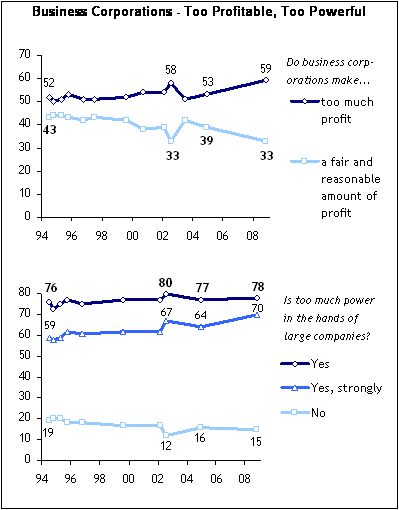
The biggest partisan division is on the question of business profits. Republicans are roughly divided, with 49% saying business corporations make a fair and reasonable amount

of profit, while 45% say they make too much. But Democrats, by a 73% to 21% margin, believe that corporations are making too much profit. There is a similar division along educational and income lines – college graduates and those with household incomes over $75,000 annually are split over whether corporate profits are fair or not. But those with less education, and those with lower incomes see profits as excessive by margins of two-to-one or more.




